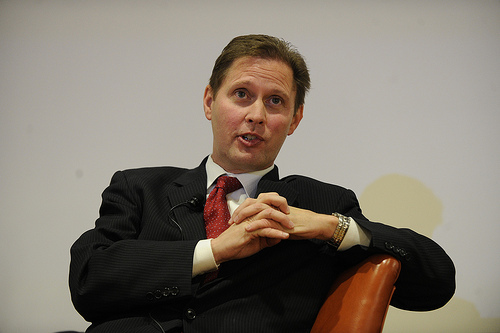Florida Gov. Rick Scott surprised many political analysts in February when he announced he supported expanding Medicaid under President Obama’s health care law. But despite his public advocacy for the expansion, the Florida legislature could not resolve conflicting proposals, and the state’s legislative term came to an end with no action on the expansion.
Joins Obama on Expansion
Each state must decide whether to expand its Medicaid program to facilitate Obamacare. For Medicaid expansion to occur in Florida, the legislature would have to approve a Medicaid expansion bill and Scott, a Republican, would have to forego a veto.
Nearly 20 percent of Floridians are already on Medicaid. The Scott administration projects expanding the program to approximately 25 percent of Floridians, as advocated by the Obama administration, would cost state taxpayers $5 billion during the next 10 years, and federal taxpayers (including Floridians paying federal taxes) an additional $45 billion during the next 10 years.
Scott aggressively championed the Medicaid expansion during his March 5 State of the State address.
“Our options are either having Floridians pay to fund this program in other states while denying health care to our citizens, or using federal funding to help some of the poorest in our state with the Medicaid program as we explore other health care improvement,” said Scott.
“As I wrestled with this decision, I thought about my Mom and her struggles to get my little brother the care he needed with very little money. I concluded that for the three years the federal government is committed to paying 100 percent of the cost of new people in Medicaid, I cannot, in good conscience, deny the uninsured access to care,” Scott said.
Still Lacking Votes
Democrats legislators appeared united in their support of Medicaid expansion, but Republicans hold strong majorities in the Florida House and Senate. Accordingly, Democrats needed several Republicans in both the House and Senate to support the Medicaid expansion for it to become law.
Conservatives in Florida and other states are nearly united in their opposition to Medicaid expansion, with Scott’s defection a notable exception. In the Senate, political insiders told Health Care News there appeared to be several liberal Republicans willing to join Democrats in support of the measure. Accordingly, the real drama played out in the more conservative House, which also must approve a Medicaid bill for it to become law.
Before the full House could vote on a Medicaid bill, the House Select Committee on the Patient Protection and the Affordable Care Act must draft and approve such legislation. But it rejected the measure in March and April. This presented Democrats with a twofold setback, which halted legislation dead in its tracks and signaled that even if expansion supporters somehow got a bill to the full House floor, Republicans would likely reject it. Attempts to attach the expansion to other measures or push through a Senate-backed partial expansion also proved unsuccessful.
Conservatives Standing Firm
Tom Lauder, a reporter for Media Trackers Florida, which is closely following the state’s Medicaid debate, says House Republicans appear likely to stand firm against expansion, which they’ve termed “Obamacaid.”
“Sources very close to the Republican leadership tell me Obamacaid supporters are not close to luring enough House Republicans to pass a bill,” Lauder said. “Also, Senate Republicans are unlikely to stick their necks out for President Obama and Gov. Scott and vote for Obamacaid unless they know the House will vote similarly.”
“Grassroots conservatives are very active pressuring Republican legislators not to pass Obamacaid, and Republican legislators are taking notice,” said Lauder.
Political Fallout for Scott
As for Scott, who was elected to the governorship in part thanks to his opposition to Obama’s health care law, the political consequences could prove significant.
“Grassroots conservatives are particularly upset with Gov. Scott using the language of the left in his efforts to build momentum for Obamacaid,” Lauder explained. “When Scott argues, ‘I cannot, in good conscience, deny the uninsured access to care,’ he asserts that the only time people have access to goods and services is when government gives it to them as an entitlement.
“Scott’s conservative base also resents Scott talking about federal funding as if it were free money,” Lauder added. “Even if the federal government kept its promise to fund most of the Florida Medicaid expansion, which many conservatives doubt will be the case, Floridians pay federal taxes in addition to state taxes. Federal dollars flowing into Florida are not free dollars, even for Floridians. Plus, Florida conservatives, like conservatives in other states, realize that our ballooning federal debt is unsustainable. They worry about their country.”
According to Lauder, the lesson from Scott’s experience should dissuade Republican governors in other states from attempting to push through any Medicaid expansions.
“Scott has enraged his conservative base by making this big-government argument, especially when nearly 20 percent of state residents already qualify for Medicaid. This isn’t a question of whether government should give Medicaid to the poor and disabled, because the poor and disabled already qualify for Medicaid,” Lauder said. “If we can’t pay our bills with 20 percent of Floridians on Medicaid, how can we pay our bills with 25 percent of Floridians on Medicaid?”





